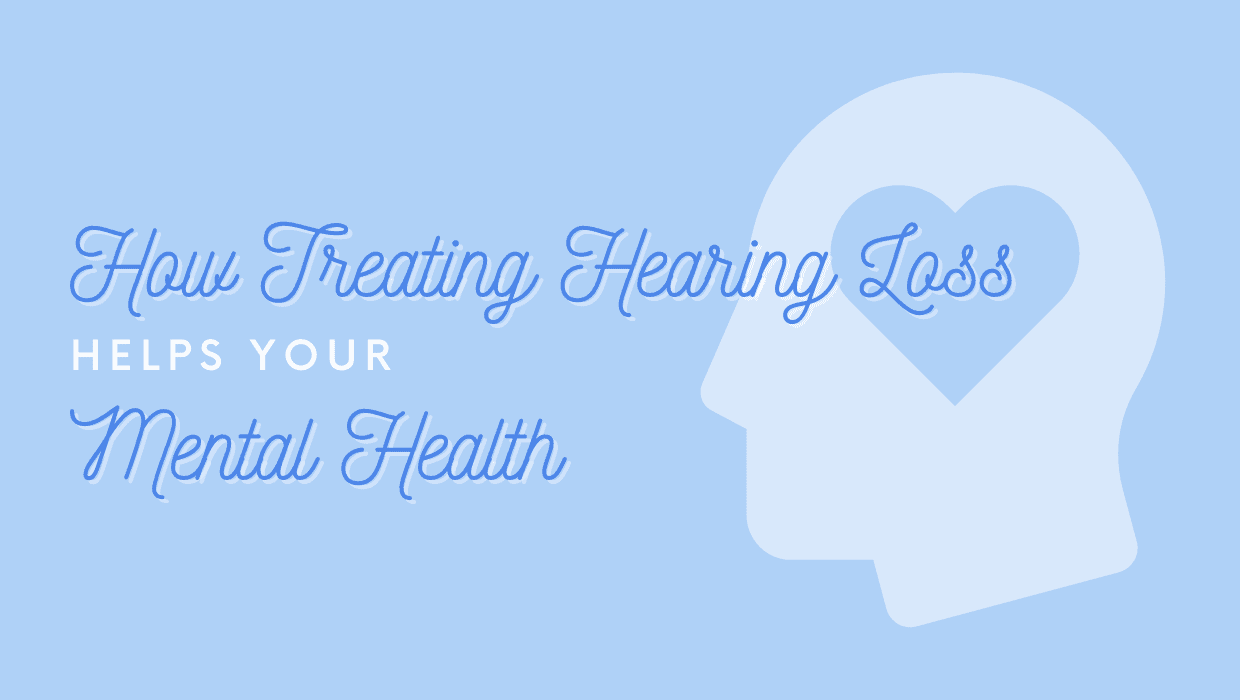
- How Spending Time Outdoors Enhances Hearing Health - July 16, 2024
- Exploring the Impact of Sports on Hearing Health - July 3, 2024
- The Impact of Diet on Hearing Loss - June 28, 2024
Did you know that there’s a link between hearing loss and mental health conditions? If you’re living with hearing loss, this probably makes a lot of sense. People living with untreated hearing loss have a harder time having conversations with their loved ones, and struggle to hear in places with background noise. Hearing loss also makes it harder to get around, since you can’t hear all the sounds around you. People with hearing loss are more likely to experience stress, anxiety, social isolation, and depression when compared to those who treat their hearing loss with hearing aids.
Do You Have Hearing Loss?
Hearing loss can affect everyone, regardless of age. Seniors, adults, teenagers, and even children can have a hearing loss that impacts their mental health. Young adults can suffer hearing loss due to unsafe listening practices, like when they turn up the volume on their music when wearing earbuds. Older adults risk their hearing health at noisy jobs, and during loud leisure activities like attending rock concerts or sports events. Seniors may face age-related hearing loss. Whatever the cause of hearing loss, living with untreated hearing loss affects your mental health.
Hearing Loss and Mental Health
If you’re living with untreated hearing loss, you’ll soon notice a decrease in your overall quality of life. Hearing is important for easy communication with your family and friends, and when you can’t hear what’s being said, it makes communication much harder. When you’re not enjoying good conversations with your loved ones, you’re more likely to feel frustrated, upset, and socially isolated. You’ll withdraw from social situations, stay home rather than facing a difficult communication setting, and feel more lonely and depressed.
Unaddressed hearing loss can also take away your independence. You may not feel safe driving since you can’t hear the sounds around you. Or you may worry when you’re walking in the park, since you aren’t able to hear the sounds of the children playing nearby, or the sound of someone coming up the path behind you. People with hearing loss are less independent, and this can lead to more feelings of isolation and depression.
Treating Hearing Loss
Just because you have hearing loss doesn’t mean you have to live with mental health challenges. Treating hearing loss can improve your mental health. With quality hearing aids you’ll be able to participate in conversations, enjoy social events, and hear in places with a lot of background noise. Treating hearing loss with hearing aids can reduce the symptoms of anxiety and stress. They’ll also help you stay socially active, and reduce the symptoms of depression. Treating your hearing loss will boost your mood, help you communicate, make you feel emotionally stable, and improve your mental health.
You’ll be able to have effortless conversations with your loved ones, without straining to hear what they’ve said. Treating hearing loss keeps you socially active and engaged, and improves your mental health. Clear communication will strengthen your relationships with your family and friends. You’ll enjoy intimate moments with your loved ones, and share all the little things in life that make life meaningful.
Wearing hearing aids will also help you hear the sounds in your environment. You’ll even be able to hear all the soft sounds around you, and have an easier time localizing sounds. This means you can have awareness of your surroundings, be more independent, and feel more confident.
Test Your Hearing
One easy thing you can do for your mental health is to get a hearing test. Our team of hearing health specialists will help you discover exactly what sounds you can and can’t hear. If you have a hearing loss, we’ll suggest the perfect hearing aids so you can get back to hearing clearly.
Modern hearing aids are sleek devices that fit seamlessly into your life. You can choose from a behind-the-ear device that tucks discreetly behind your ear, or find an in-the-ear or in-the-canal hearing aid that sits inside the ear. Some hearing aids are rechargeable, and many can be controlled from your smartphone, or connected to your other technology! Whatever your hearing needs and lifestyle, you can find a hearing aid that will help you hear, and help your mental health.
